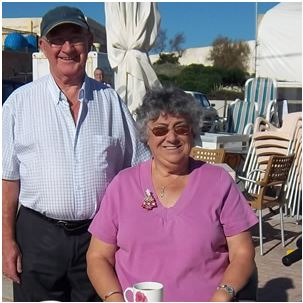SwansFan Clocks up 11 Gold Medals Walking with Activ8rlives
Ron aged 86-years young has been walking with an Activ8rlives BuddyBand activity tracker (accelerometer) since early September 2013. He has recently been awarded his eleventh Gold Medal for walking at least 10,000 steps a day for 1,925 days, which equates to about 80+ minutes of walking for Ron on each of those days. In during this time he has walked and recorded over 22 million steps, no wonder he has walked the soles off 11 pairs of shoes!
As retirees, Sandra and Ron spend the winter months in Malta and the summer in the UK. With the warmer winter months in Malta, Ron is able to achieve and maintain a consistent 10,000 steps per day. By working together, Sandra and Ron have learned about their activity patterns and work on simple ways to make small changes during the colder weather to ensure they remain active. When we first wrote about Ron, he was well on his way to achieving his first Gold Medal with Activ8rlives back in September 2013.
Activ8rlives says: The logical assumption is that by connecting patients with technology – equipping them with access to their personal health data or the educational information relevant to their condition – they’ll take a more active role in their care. But the key is not just the technology and educational tools, but gaining insights into what behaviours motivate them, how it makes that person tick and how they sustain their engagement.
Accelerometers and pedometers don’t make people walk more, they are just facilitators. Unless they’re paired with some insight into human behaviour, they are not going to activate the person.
According to the King’s Fund about 15 million people in England have a long-term condition and the cost to the NHS is close to 70% of its overall budget and the number of people with multiple long-term conditions is rising1. Many people don’t feel confident enough to manage their own health, leaving people far more exposed to a deterioration in their condition.
Studies show2 that targeted interventions, such as Ron’s ability to be able to walk 10,000 steps most day, increase a person’s activation and their capacity to self-manage their condition more effectively. Peoples’ activation describes the knowledge, skills and confidence a person has in managing their own health and care.
There is strong evidence demonstrating that exercise can improve or maintain health for all forms of long-term conditions4. For those diagnosed, once acute treatment by the NHS has ceased, participants are limited by support until they become acutely unwell or frail and then the costs to the health and care system escalate. They are also at rising risk of hospitalisation, with increased requirement for GP appointments.
Ron has shown a high level of patient activation and if we are as active as Ron when we are 88-years of age, we will be very pleased with ourselves. Research studies consistently demonstrate that being active in later life and in retirement wards off dementia, signs of old age, reduces our cancer and cardiovascular risks. It also helps us to control our long-term health conditions that we tend to develop during later life.
Keep it going Ron and Sandra – what a great example to us all to remain active as we age well and gracefully.
References:
1. www.kingsfund.org.uk/publications/supporting-people-manage-their-health
2. Sacha J, Sacha M, Soboń J, Borysiuk Z, Feusette P. Is It Time to Begin a Public Campaign Concerning Frailty and Pre-frailty? A Review Article. Frontiers in Physiology. 2017; 8:484.
3. McMillan Exercise Evidence Review
4. Hibbard, J and Gilburt, H. (2014) Supporting people to manage their health. The Kings Fund. https://www.kingsfund.org.uk/sites/default/files/field/field_publication_file/supporting-people-manage-health-patient-activation-may14.pdf

